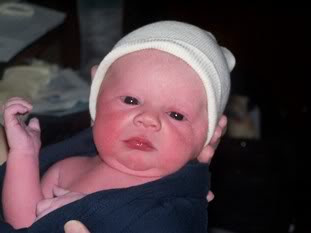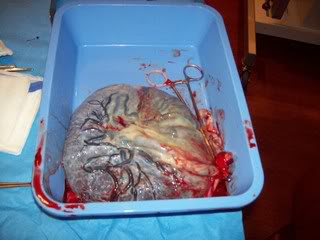
Awww...look at that sweet just-born baby! Growing a baby is an amazing process! Even a conception itself is a miracle. Each month, for a couple not dealing with fertility issues, the chance of conception is anywhere from 15%-30%. Once that obstacle is overcome the work of supporting and growing a human being is an amazing process!!! One if the components of that process is the......(see what I'm doing here? I'm easing some of you into this....ready??)......

placenta!!!
I think we can all agree that adequate nutrition is vital during pregnancy. The woman needs the nutrients for her own body systems to function well. She is supporting her own body changes and she is helping to grow another human being. There are many changes to a woman's body during pregnancy, some that might surprise you (did you know the heart shifts position just a bit?), but that's a post for another day. Many of those changes depend on proper nutrition! When I say "good nutrition" I am talking about a diet that consists of adequate water (at least half the body weight in ounces each day of WATER), protein (at least 70 grams a day), and vitamin/mineral intake. It is also a diet that is 90% free of processed foods. The woman is getting plenty of fresh or frozen vegetables, some fruits, whole grains, and so on. When I say "poor nutrition" I am talking about a diet that consists of less than adequate amounts of those components. It is also heavy with processed foods.
The baby also needs good nutrients supplied to him/her in order to grow well. There is an entire body system being made here!! Organs are developing. Nerves are developing. A brain is growing. Nutrients are being stored.
In order to get those nutrients and the benefits of them we need a healthy placenta! The placenta implants in the uterus very early in pregnancy. What begins as cells grows into that picture above. The process of the uterus preparing for implantation and the development of the placenta can be read about at these websites:
For the visual learners, here is a video:
Read about it! Placental development is fascinating!!!
With such an important role during pregnancy it is important that expecting women remember to care for their placenta as well as their own body and the baby. Speaking anecdotally, I have seen the difference in a placenta from a woman who has had good nutrition and a woman who ate a diet high in processed foods. The differences are quite interesting. Even when a woman hides her true diet or forgets to bring in her one-week diet sheet (that we ask for at least once during pregnancy), the placenta will tell about her diet.
Still speaking anecdotally from my experience so far, a placenta from a woman who has had a good deal of processed foods has quite a different appearance. A healthy placenta is tough but has a softness to it. The lobes fit together well and are not prone to falling apart. On the other hand, a woman who has had a less than adequate diet has a placenta that is tough to the touch.
There is also a "grissly" feel to it, like there are very small pins sticking out of it (that is the best description I can think of...those of you who have felt it will know what I mean and may have a better description). While the lobes fit together (and we want that so we know there are no pieces still left inside the uterus), it seems harder to keep ahold of the placenta to do it because the placenta is trying to fall apart in your hands.
The point of my post is this: I am curious to know of other birth workers have seen a correlation between less than ideal nutrition and placenta issues at birth and postpartum (either appearance and/or outcomes such as retained placenta and PPH). If so, what have you seen? In subsequent pregnancies have you seen a woman do better with nutrition and have a better outcome?


2 comments:
Yes, I've seen a correlation between nutrition and the state of the placenta. I've always thought that an "unhealthy" placenta feels a lot like florist foam when you stick your finger into it. As a testament to our amazing bodies, though, babies seem to do fine even when the placenta was obviously not optimal. I do worry about the mom in years to come, though.
With my first pregnancy, I didn't eat such a hot diet, and my placentas (I had two because they were twins) were definitely more calcified and in poor condition. My second pregnancy I ate a bit better, but I did have issues with a retained placenta and post-partum hemmorage. I am not sure if that was related to nutrition or because I was induced with pitocin. My last birth, I made a serious effort to have a better diet and drank pregnancy tea as well. My placenta was beautiful! It looked so healthy, and I didn't have the bleeding issues that I did with the other two births. I definitely think that nutrition plays a huge part.
Post a Comment